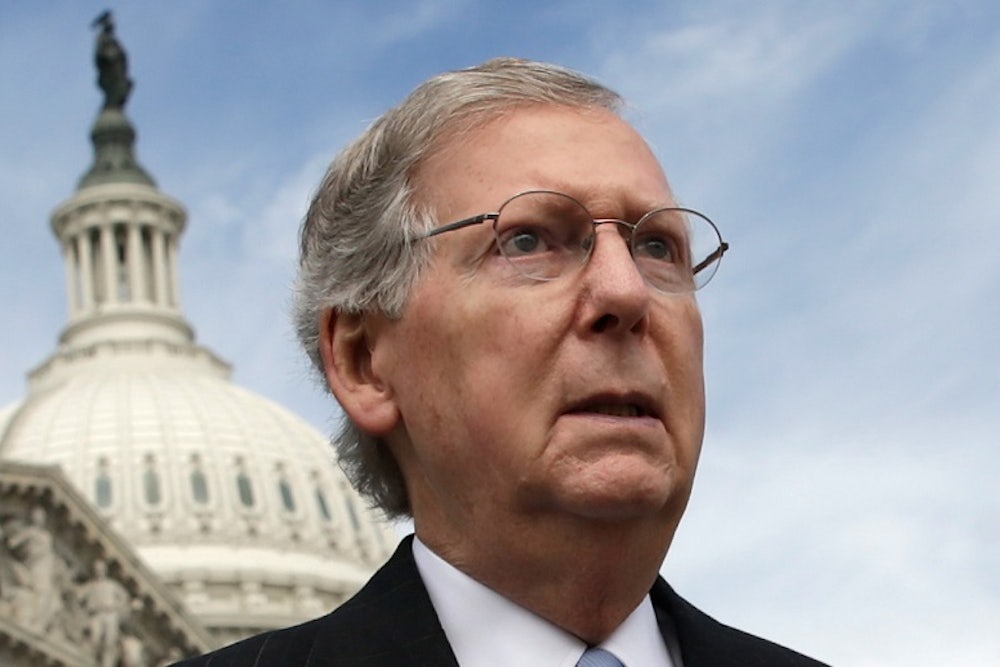Republicans are tripping over themselves to propose ideas to hit Russia for its invasion of Ukraine. But at the same time, they are limiting Ukraine’s ability to borrow money from the International Monetary Fund. That makes it more likely Ukraine will default on its debt, which could destabilize the country and invite exactly what the Republicans want to prevent: further Russian aggression.
Back in 2010, the G20 countries agreed to reforms of the IMF that would double the financial commitment each country makes to the fund (and how much they can borrow) and give emerging countries a larger representation on the executive board. For the United States, this means almost nothing. We already give a little over $65 billion to the main fund. These reforms require the U.S. to transfer $63 billion from a supplemental IMF fund, which would be reduced as part of these reforms, to the main fund, but it "would not increase total U.S. commitments to the IMF," a Congressional Research Service report found. (The U.S. has more control of the money in the supplemental fund, but the Congressional Research Service also notes that quota commitments are considered "very safe" and that "the United States has never lost money on its quota commitments.")
But despite the almost non-existent impact the reforms would have on the U.S., they have gotten caught up in Washington politics. The Obama administration did not make them a top priority until after his reelection, but has included them in its budget this year and last year. In January, the White House fought to include them in the omnibus spending bill. But Mitch McConnell decided to use them as a bargaining chip and demanded that the Treasury Department block new IRS rules that would curb politically active nonprofits. The administration refused, and the reforms are still languishing in Congress.
Why is this important? The reforms would allow Ukraine to borrow approximately 60 percent more (from $1 billion to $1.6 billion) from the IMF’s emergency fund. That’s money that Ukraine can use to pay off its debts and avoid a default. In certain scenarios, the IMF makes exceptions and allows countries to access additional funds, as it did with Greece and Ireland after the financial crisis. But there’s no guarantee it would do so with Ukraine. By blocking the passage of the IMF reforms, Republicans are actively making it harder for Ukraine to pay back its loans.
The U.S.’s refusal to pass the reforms—which 130 countries have already approved—only hurts our credibility. Given the broad constituency of nations that want to help Ukraine, this won’t stop the IMF from offering a loan. But it’s a bit rich for the U.S. to call for IMF help when it refuses to pass basic reforms that would have no material effect on the United States and that most of the world has already approved.
“The rest of the world is furious at us,” Ted Truman, a senior fellow at the Peterson Institute for International Economics and the assistant secretary of the U.S. Treasury for International Affairs from 1998 to 2001, said. “For us to say, ‘We just stiffed you in January’ and now we’re turning around to try to ask you to be part of the team helping Ukraine, we look silly.”
“It does undermine our credibility and leadership,” he added. “We look like we’re giving with our right hand and taking with our left hand.”
With Congress ready to bring up legislation for a $1 billion loan that Secretary of State John Kerry pledged to Ukraine on Tuesday, the administration and IMF are hoping to use that bill as a vehicle for the IMF reforms. But don’t get too excited. Despite the fact that the reforms do not increase U.S. financial obligations to the IMF, the Congressional Budget Office has scored it as increasing the deficit by $315 million for technical reasons. That means it requires appropriations and Jennifer Hing, the communications director for the House Appropriations Committee, tells me that the reforms will not be included in the legislation.
Some Republicans don't consider the cost of the reforms trivial. "We don’t believe this is just a book-keeping entry," California Congressman John Campbell told Treasury Secretary Jack Lew in January, according to Politico. "This puts the $63 billion significantly at risk, whereas currently it is not." Others don't like the IMF and refuse to vote for anything that does not cut U.S. to it. And some, like McConnell, simply see the reforms as a way to get something from Obama in return—Ukraine's financial stability be damned.
Stay informed with The New Republic's Ukraine Newsletter. Sign-up here.
